Can being homeless be illegal? The heated debate over what to do with the 650,000 people without housing in the US
States and cities are oscillating between criminalization and providing social support to address a problem that affects all corners of the country
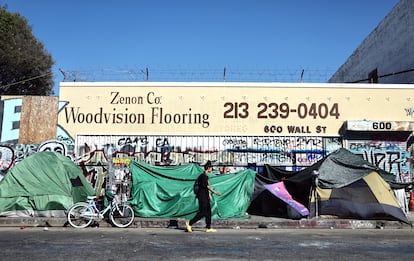
A Supreme Court ruling ignited the debate. As has now become customary in the United States, decisions by the country’s highest court have defined some of the most heated discussions on social issues, from abortion — with its decision to overturn women’s federal right to terminate a pregnancy —, to affirmative action, immigration and deportations. On June 28, the issue at stake was the situation of homeless people, an endemic problem that in 2023 reached a historic high, with more than 650,000 people living on the streets, a rise of 12% compared to the previous year.
The Supreme Court, which voted along clear ideological lines — the six conservative judges, three appointed by Donald Trump, against the three liberal judges — ruled that local governments could impose laws prohibiting people from sleeping on the streets, in tents or outdoors, and could fine or even arrest people who did not comply with these rules. Since then, homelessness has been a major issue across the United States — from California, the state with the largest homeless population with 180,000 rough sleepers, to Florida, on the other side of the country — and measures have begun to be adopted that, despite being legal, have generated controversy and even conflicts between administrations.
The Supreme Court’s ruling was the result of a petition by the city of Grants Pass, Oregon, to review a 2018 ruling by a lower court that limited cities’ ability to respond to the growing homelessness problem with forced evictions. Justice Neil M. Gorsuch, writing for the court’s conservative majority, said the halted Grants Pass ordinance criminalizing sleeping or camping in public spaces did not violate the U.S. Constitution. According to his reading, the rule does not criminalize being homeless, but rather camping in certain places. “It makes no difference whether the charged defendant is currently a person experiencing homelessness, a backpacker on vacation, or a student who abandons his dorm room to camp out in protest on the lawn of a municipal building,” he wrote in the opinion.
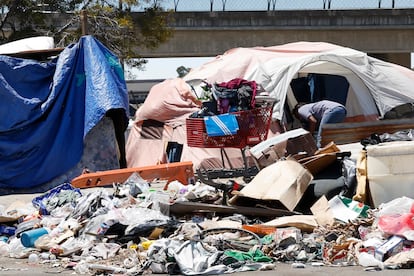
On the other side, liberal Justice Sonia Sotomayor, joined by Justices Elena Kagan and Ketanji Brown Jackson, argued that the decision would leave society’s most vulnerable people with even fewer protections. “Sleep is a biological necessity, not a crime. For some people, sleeping outside is their only option,” Sotomayor said, adding that fining or even jailing people “for sleeping anywhere in public at any time, including in their cars, if they use as little as a blanket to keep warm or a rolled-up shirt as a pillow” essentially them for being homeless. “That is unconscionable and unconstitutional,” she said in the dissenting opinion.
Despite the divisions within the Supreme Court, the decision is final and was in fact warmly received, especially by California, one of the most progressive states in the country. On July 25, California Governor Gavin Newsom issued an executive order to remove homeless encampments, which have become part of the landscape in cities such as Los Angeles and San Francisco, throughout the state. The decree directs state agencies to adopt “humane and dignified policies,” such as notifying homeless people before removing their tents from public roads. Although the order cannot force cities and counties to take action, it allows them the state government to pause million-dollar resource transfers as a means of applying pressure.
It is the next step in a crusade against one of California’s main problems. Since 2021, authorities have removed 11,000 camps and collected dozens of tons of trash on state roads. The new executive order prioritizes the removal of camps that “pose threats to life, health, and safety” of communities. By law, authorities will keep the collected property and objects for 60 days to see if anyone claims them.
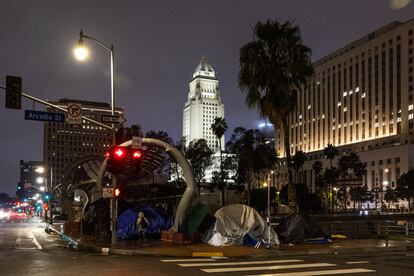
In San Francisco, where the problem has been ongoing for decades, the order was greeted with enthusiasm. In this bastion of American progressivism, Democratic Mayor London Breed has embraced the powers granted to her by the Supreme Court decision and Newsom’s order. People in San Francisco have become fed up with the practically permanent encampments, the open drug use in them and how they increase the feeling of insecurity: the issue is the most pressing question for about half of the city’s residents.
Breed recently ordered police to fine homeless people who refuse shelter, and even use the threat of arrest as well. With her re-election on the line in November’s election, the mayor has promised to “clean up” the city and deliver results within weeks.
However, Los Angeles Mayor Karen Bass was quick to say she would not follow Governor Newsom’s directive, as her city — home to the infamous Skid Row, a downtown neighborhood estimated to have around 4,400 homeless people, where homelessness has been an issue since the 1930s — has seen positive results from its own program to address the homeless situation. For the first time in years, Los Angeles has slightly reduced the number of people who are homeless with a strategy that involves moving them into motels or shelters. “This ruling must not be used as an excuse for cities across the country to attempt to arrest their way out of this problem or hide the homelessness crisis in neighboring cities or in jail,” Mayor Bass said. “The only way to address this crisis is to bring people indoors with housing and supportive services.”
Following the ruling, the debate has revolved around the balance between enforcing existing or new laws prohibiting camping and providing support services to facilitate access to housing. Some experts believe that one of the most efficient responses to this problem is the construction of affordable housing, which is a very scarce commodity today. Logic dictates that once people have permanent housing, it is easier for them to address their possible mental health or drug addiction problems.
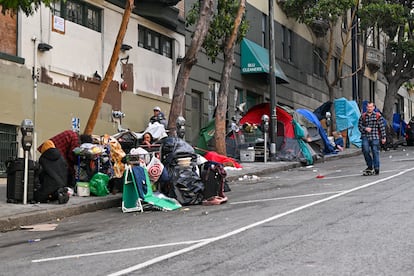
According to conservative critics, this approach has not worked. Landmark legislation drafted by the Cicero Institute, a Texas think tank, has provided the basis for new laws in Florida, Georgia, Oklahoma and other Republican states that have cracked down on encampments and moved away from a strategy that prioritized housing people. Instead, these states advocate for detaining and diagnosing each case so that specific priority solutions can be offered, such as access to employment, drug treatment, mental health care or, simply, housing.
In Ron DeSantis’ Florida, a ban on sleeping in public that specifically targets homeless people will go into effect in October. In Miami Beach, a very similar rule is already in place and will be enforced more intensively in August. Under the rule, a person faces 60 days in jail and a $500 fine for refusing a bed in a shelter.
There is no doubt that the Supreme Court’s decision has emboldened those who advocate for a tough approach to a situation that is intimately linked to the opioid crisis and the mental health epidemic. Still, the court’s verdict leaves civil protections intact by prohibiting excessive fines and violations of due process. In fact, local governments can be sued, which is precisely what happened in Spokane, Oregon, last Thursday. The plaintiffs — a local organization that helps homeless people and two individuals who have faced this situation, one of whom is still homeless — claim that the regulations imposed by the authorities “criminalize homelessness.” The Supreme Court’s decision may be final, but the debate is only just beginning.
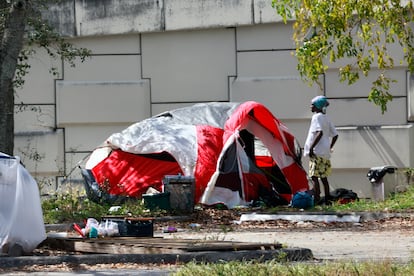
Sign up for our weekly newsletter to get more English-language news coverage from EL PAÍS USA Edition
Tu suscripción se está usando en otro dispositivo
¿Quieres añadir otro usuario a tu suscripción?
Si continúas leyendo en este dispositivo, no se podrá leer en el otro.
FlechaTu suscripción se está usando en otro dispositivo y solo puedes acceder a EL PAÍS desde un dispositivo a la vez.
Si quieres compartir tu cuenta, cambia tu suscripción a la modalidad Premium, así podrás añadir otro usuario. Cada uno accederá con su propia cuenta de email, lo que os permitirá personalizar vuestra experiencia en EL PAÍS.
¿Tienes una suscripción de empresa? Accede aquí para contratar más cuentas.
En el caso de no saber quién está usando tu cuenta, te recomendamos cambiar tu contraseña aquí.
Si decides continuar compartiendo tu cuenta, este mensaje se mostrará en tu dispositivo y en el de la otra persona que está usando tu cuenta de forma indefinida, afectando a tu experiencia de lectura. Puedes consultar aquí los términos y condiciones de la suscripción digital.









































